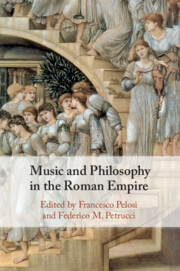Book contents
- Music and Philosophy in the Roman Empire
- Music and Philosophy in the Roman Empire
- Copyright page
- Contents
- Notes on Contributors
- Acknowledgements
- Abbreviations
- Introduction
- Chapter 1 The Scala Naturae and Music
- Chapter 2 Music and Plutarch’s Platonic Cosmos
- Chapter 3 The Harmoniser God
- Chapter 4 Alexander of Aphrodisias and Musical Models for Ontological Enquiries
- Chapter 5 How to Resist Musical Dogmatism
- Chapter 6 Shifting Epistemological Perspectives in Ptolemy’s Harmonics
- Chapter 7 Musical Imagery in Clement of Alexandria and Origen
- Chapter 8 Plotinus on Music, Rhythm, and Harmony
- Chapter 9 Porphyry’s Commentary on Ptolemy’s Harmonics
- Chapter 10 The Music of the Virtues in Late Ancient Platonism
- Chapter 11 Harmonics as Theological Paradigm in Proclus
- Chapter 12 Calcidius on Cosmic Harmony
- Chapter 13 Harmonia in Philoponus’ Commentary on Nicomachus’ Introduction to Arithmetic
- Bibliography
- Index Locorum
- General Index
Chapter 2 - Music and Plutarch’s Platonic Cosmos
Published online by Cambridge University Press: 27 November 2020
- Music and Philosophy in the Roman Empire
- Music and Philosophy in the Roman Empire
- Copyright page
- Contents
- Notes on Contributors
- Acknowledgements
- Abbreviations
- Introduction
- Chapter 1 The Scala Naturae and Music
- Chapter 2 Music and Plutarch’s Platonic Cosmos
- Chapter 3 The Harmoniser God
- Chapter 4 Alexander of Aphrodisias and Musical Models for Ontological Enquiries
- Chapter 5 How to Resist Musical Dogmatism
- Chapter 6 Shifting Epistemological Perspectives in Ptolemy’s Harmonics
- Chapter 7 Musical Imagery in Clement of Alexandria and Origen
- Chapter 8 Plotinus on Music, Rhythm, and Harmony
- Chapter 9 Porphyry’s Commentary on Ptolemy’s Harmonics
- Chapter 10 The Music of the Virtues in Late Ancient Platonism
- Chapter 11 Harmonics as Theological Paradigm in Proclus
- Chapter 12 Calcidius on Cosmic Harmony
- Chapter 13 Harmonia in Philoponus’ Commentary on Nicomachus’ Introduction to Arithmetic
- Bibliography
- Index Locorum
- General Index
Summary
By exploring three issues which connect music with Platonic cosmology, I argue that, according to Plutarch, this connection was at the same time very important and severely limited. (1) In several passages of De animae procreatione, Plutarch compares the demiurge to a musician. These comparisons suggest a certain degree of similarity, but also a significant degree of difference between the two and, accordingly, between cosmic harmony and music. (2) Similarly, Plutarch’s reception of the notion of ‘music of the spheres’, as it emerges from a discussion in Quaestiones convivales, confirms the connection between music and the cosmos only to a limited extent. What the answers of the discussion have in common is that they all warn against excessive appreciation of music. (3) Finally, in Amatorius and De Pythiae oraculis, Plutarch distances musical experience from divine inspiration (enthousiasmos). In general, this persistent combination of importance and limitedness can be explained by Plutarch’s interpretation of Plato’s Timaeus.
- Type
- Chapter
- Information
- Music and Philosophy in the Roman Empire , pp. 38 - 59Publisher: Cambridge University PressPrint publication year: 2020

